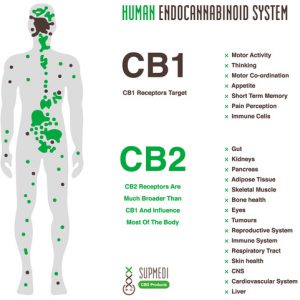
Can CBD Help To Fight Arteriosclerosis?
10 August 2020In a previous blog, we reported on about the potential of CBD in the fight against cancer. Researchers in Switzerland now report that CBD also has the potential to serve as a medicine for cardiovascular disease, the main cause of death after cancer in the many countries. CBD against arteriosclerosis could thus make a serious contribution to our national public health. In this blog, we explore the possibilities that cannabidiol offers in arteriosclerosis.
CBD Against Arteriosclerosis?
A human being is born with clean arteries, which are smooth on the inside. If the inside of the arterial wall is damaged, our body makes sure that the white blood cells cure the damaged arterial wall and prevent inflammation. The white blood cells force themselves through that damaged place. Besides this, also cholesterol attaches itself on the wall. This is how a layer is formed on the wall, a substance we call plaque. In places where inflammatory cells accumulate and the layer of plaque is building up, the artery is slowly getting blocked. This means the blood flow to parts of the body is decreased.
When it comes to the vital organs, for example the heart or the brain, life threatening problems can occur. like a cardiac or cerebral vascular disease. It’s also possible that a part of the plaque breaks off and blocks an entire artery in another place in the body. We call this embolism.
Symptoms Of Arteriosclerosis
Arteriosclerosis can occur in a lot of places in the body. This means that it could have been present for a long time, but that you haven’t mentioned it. To be able to recognize arteriosclerosis, the following problems are the most common symptoms:
• Chest pain when exercising
• Pain when walking (also called Intermittent Claudication)
The Role Of The Endocannabinoid System (ECS).
Because we know that they play an important role in keeping our arteries healthy, the reserachers decided to study tissue on the presence of endocannabinoids. These substances, named after the cannabis plant, are messengers that transmit information between cells. The plaque tissue from people who were hit by a cerebral infarction was compared with plaque tissue from people without these kinds of problems, and they discovered something very interesting. In the plaque tissue from the healthy people, larger amounts of endocannabinoids and more cannabinoid 2 receptors (CB2) were found. In the people who were hit by a cerebral infarction they found way less of these. The scientists concluded that activating the CB2 receptors can protect you from the effects of arteriosclerosis.

CBD Can Activate CB2 Receptors
Just like the endogenous endocannabinoids, CBD can activate common receptors in our body. A receptor can be seen as a kind of button on the arterial wall, which can be pushed by certain substances. If the button is pushed, the cell gets an order to do something, for example to control inflammation. Because scientists discovered that activating the CB2 receptors in plaque can provide protection, CBD is now seen by them as a possible medicine for arteriosclerosis.
CBD Against Inflammation And Stress
What isn’t mentioned at all in this research, is the fact that generally CBD oil works well for inflammations. This is because CBD can also activate other specifically anti-inflammatory receptors. This could be a way in which CBD helpt to fight Arteriosclerosis. Furthermore, there is a lot of knowledge about the increased risk of cardiovascular disease caused by stress. Besides an unhealthy lifestyle, stress is one of the biggest causes of arteriosclerosis. And we can’t deny that CBD helps a lot of people relax!

More ways to prevent arteriosclerosis, besides the use of CBD oil, there are more ways to prevent arteriosclerosis and to try to reduce the risk:
- Smoking
- High blood pressure
- High cholestrol level
- Diabetes
- Obesity
- Stress
So basically, it all comes down to a healthy life style. Fortunately, our CBD Tablets and other CBD supplements can help you maintain that lifestyle in a natural way!
Source: https://www.ncbi.nlm.nih.gov/pmc/articles/PMC3345556/







